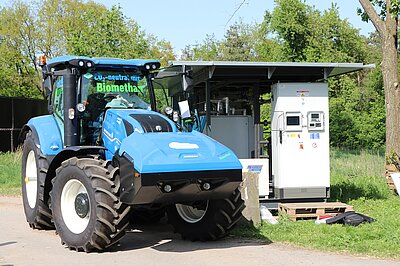WG Livestock-environment interactions
Our research contributes to a better understanding of the role of livestock in sustainable and circular bioeconomy systems. We address societal challenges and develop solutions from basic scientific research to practical implementation. Based on the holistic ONE-HEALTH concept, we investigate interactions of farm animals in their environment. Our research results lay the foundation for adaptive process control mechanisms and management strategies towards an environmentally friendly, health-promoting, animal-friendly and profitable agriculture with high resource efficiency.
The scientific objectives are the definition of indicators for animal health and welfare, the reduction of antimicrobial resistance (AMR), the reduction of gaseous emissions, the replacement of fossil fuels and the development of corresponding sensor technologies. In the field of data science, we use a variety of artificial intelligence and machine learning techniques to detect emissions, stress conditions and infectious diseases in livestock at an early stage, to better understand and mitigate the mechanisms of transmission and spread of antimicrobial resistance in the environment and to control energy management processes based on renewable energy systems for defossilisation.
Intelligent/automated sensor data acquisition and management systems are at the heart of solving optimisation and control problems. We integrate new methods for capturing and recording a wide range of sensor information into a centre for data analysis, modelling and decision support. We use data science techniques for monitoring, simulation and automation in (near) real-time modelling and bi-directional information flow (DT), e.g. for predictive control of barn climate in naturally ventilated dairy barns and to develop digital solutions for improved decision making in animal husbandry. For example, we have developed an energy-efficient hybrid system for climate control in naturally ventilated dairy barns to effectively prevent heat stress. Optimisation is achieved through a holistic concept of a digital twin.
To predict the reaction of cows to heat stress, we use known mechanistic models and combine them with self-developed, sensor data-based algorithms (informed machine learning). To this end, we integrate physiological, behavioural and performance-related responses of animals to heat stress and identify sensitive heat stress indicators with their threshold values via non-linear relationships (artificial neutral networks). Semi-empirical models are used to control/regulate the air flow rate and the cooling of the supply air.

CFD simulation technology helps us to generate better data on heat transport in the area where the animals spend time and thus to optimise the ventilation systems both a priori and in terms of their control and regulation from a technical/energy point of view.
For defossilisation, we integrate various renewable energy systems into livestock farming and have developed a modular biomethane processing plant (bio-CNG pilot plant) for the farm's own use of biogas as a fuel.

